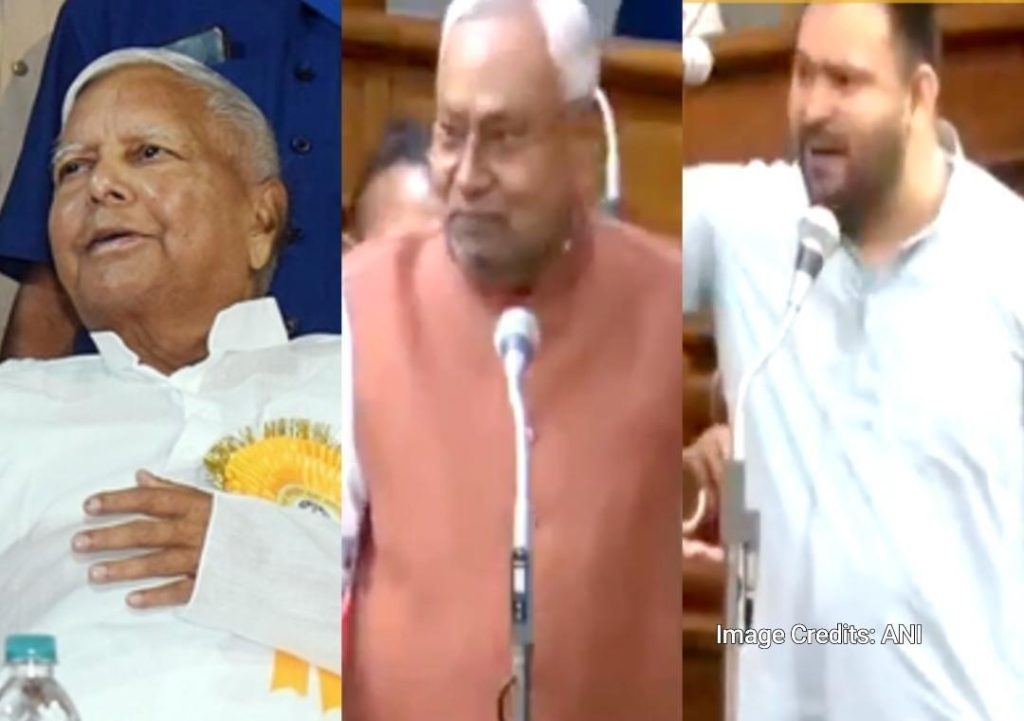
I Made Your Father Lalu What He Became: Nitish to Tejashwi
In a shocking remark, Bihar Chief Minister Nitish Kumar made a stunning claim during a heated exchange with Rashtriya Janata Dal (RJD) MLA Tejashwi Yadav in the state Assembly. Kumar, a stalwart of the Janata Dal (United) party, stated that he was the one who made Tejashwi’s father, Lalu Yadav, the leader he is today. This bold assertion has sent shockwaves across the political spectrum, with many wondering what could have led Kumar to make such a statement.
The incident took place during a heated debate on a bill in the Assembly, where Tejashwi Yadav was aggressively questioning Kumar on various issues. Kumar, seemingly unfazed by Tejashwi’s tirade, shot back by saying, “It was me who made your father what he became.” The statement sent the Assembly into a frenzy, with both benches erupting in a chorus of cheers and jeers.
So, what exactly did Nitish Kumar mean by this statement? Did he really play a role in Lalu Yadav’s rise to power? To understand the context of this remark, it is essential to delve into the history of Bihar politics and the complex relationships between the players involved.
Lalu Yadav, a firebrand leader from the RJD, was the Chief Minister of Bihar from 1990 to 1997. During his tenure, he implemented several populist schemes and policies that resonated with the masses, particularly the poor and the marginalized. However, his tenure was also marked by allegations of corruption and nepotism, which ultimately led to his downfall.
Nitish Kumar, on the other hand, was a key player in the Janata Dal (United) party and played a significant role in the formation of the government in 1990, shortly after Lalu Yadav took office. Kumar, who was then a young and ambitious politician, was reportedly very close to Lalu Yadav and was instrumental in helping him navigate the complex political landscape of Bihar.
In his statement, Kumar suggested that he had played a crucial role in helping Lalu Yadav build his political career. He mentioned that even people from Lalu Yadav’s own caste were questioning his decision to support him, but he still chose to do so. This statement has sparked intense speculation about the nature of their relationship and the extent to which Kumar may have influenced Lalu Yadav’s rise to power.
While some have interpreted Kumar’s statement as a sign of admiration for Lalu Yadav’s leadership, others have seen it as an attempt to downplay his own role in Lalu’s downfall. Lalu Yadav, who has been facing corruption charges and has been in a prolonged feud with Kumar, has denied any wrongdoing and has accused Kumar of being jealous of his popularity.
The implications of Kumar’s statement are far-reaching and have sent shockwaves across the political spectrum. Some have questioned the sincerity of Kumar’s statement, wondering whether he was trying to score political points or genuinely acknowledging his role in Lalu Yadav’s rise to power.
In the midst of this political storm, one thing is clear: the relationship between Nitish Kumar and Lalu Yadav is complex and multifaceted. While Kumar has been a key player in Bihar politics for decades, Lalu Yadav’s legacy continues to shape the state’s political landscape.
As the dust settles on this heated exchange, one question remains: what exactly did Nitish Kumar mean by his statement? Was he genuinely acknowledging his role in Lalu Yadav’s rise to power, or was he trying to score political points? Only time will tell, but one thing is certain – this statement has added a new layer of complexity to the already intricate web of relationships between the state’s political leaders.






